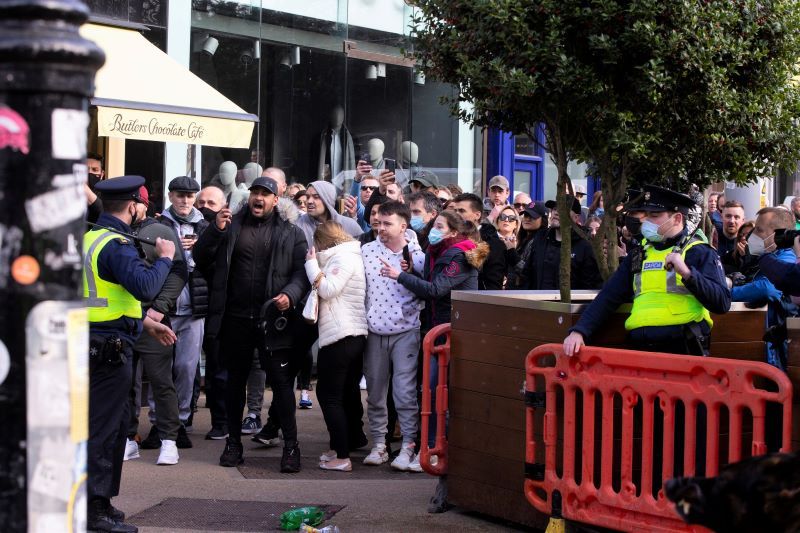RTÉ host Ryan Tubridy discussed the prevalence of conspiracy theories with Stephen Murphy, an assistant professor of marketing at Trinity College in Dublin, on RTÉ Radio 1 on Tuesday.
Their discussion comes just days after thousands of people gathered in Dublin's City Center on February 27 to protest the ongoing restrictions across Ireland.
Read more
“Why are we losing a lot of people to the rabbit hole of online conspiracy theories?," Tubridy asked during the March 2 episode of his show on RTÉ Radio 1.
Murphy, who acknowledged there are "probably lots of different answers," explained: “We’ve lost a lot of the personal freedoms that we took for granted.
"If you would have said maybe a year and a half ago that this would be the situation we’d find ourselves, you would have probably said, ‘that sounds like a conspiracy theory.’
“I think that has kind of created a perfect storm really. What we see is that people are feeling financial pressure, they’re feeling really isolated, they’re cut off from people, and during this time then, they’re turning more and more to social media, so we’re filling the time on social media.
“That has created a perfect condition for the spread of conspiracy theories.”
Murphy said that throughout his and his team's research, they've found that people turn to social media "trying to find answers to explain the situations that they find themselves in.
"Whether you’ve lost a job, or maybe you’re under pressure for keeping up with your mortgage, or whatever those real-life pressures are.
“People find themselves with more time, they go on social media and they go looking for an answer. These kinds of conspiracy explanations are only a click away really when you join particular groups and going down the rabbit hole.
“It really gives people access to a whole kind of range of information that wasn’t accessible probably before social media.”
Tubridy said: “The difficulty is that you’ve got good people finding insane ‘nonformation,’ let’s call it that.
“I’ll mention the most stupid thing of them all, which is that they’re injecting baby blood into RTÉ presenters to make them look younger.
“I mean, I was laughing over the weekend about that and saying, ‘I remember talking to Eamon de Valera about this when I was in school.’
“And then I stopped being facetious about it and went 'but people actually kind of believe that and that the government is a bunch of pedophiles.'
"It goes from comical to sinister," Tubridy said. "It's fine if it's one percent of crazy horses but when that becomes a bigger percentage of good people turning peculiar, now we kind of notice.
"And then you don't want to notice too much because then you're feeding the beast. It's a tricky one.”
Murphy agreed that it is indeed "tricky," but noted that the theories that Tubrdiy was referring to "are at the extreme end of conspiracy theories."
Murphy said: “What we’ve got to try to resist doing is to take quotes around those kinds of things and let them represent the whole phenomenon and what’s happening because you find across the spectrum there are much more reasonable explanations to what’s going on than those kinds of ones."
Tubridy acknowledged that there is a spectrum of beliefs, especially when it comes to the turnout in Dublin on Saturday: “I have no doubt that there were a bunch of people at that protest who are fed up, who think that this thing has gone on too long, their business is screwed, and they’re really upset."

February 27, 2021: Protesters on Grafton Street in Dublin. (RollingNews.ie)
“They don’t believe that there’s a basement in a pizzeria filled with Hillary Clinton and other pedophiles, they’re actually just angry," Tubridy said, referencing the Pizzagate conspiracy theory, which is considered a predecessor to today's QAnon theories.
“But do they get mixed up then with the crazier element?," Tubridy questioned. "Is that what’s happening? Is this a weird heady mix of righteously angry people and just other people who are believing complete balderdash?”
Murphy said: “To explain the events that happened at the weekend just in terms of the more extreme stuff would be to overlook the situation that may be a lot of people who turned up at that protest are actually experiencing.”
Noting that most of his research has been in the UK, Murphy said: “From speaking to people who have kind of fallen into conspiracies, there’s always a sense of kind of disenfranchisement, or they feel excluded, or they feel not heard, or they’ve lost trust in the system or authority or in experts in general.
“I think all of those things kind of come together and that’s what motivates people to start looking for alternative explanations.
“I would think that if you spoke to people who were at that march on Saturday that you would hear a lot of those same kind of things about not being heard and feeling overlooked by society.
“Basically, they want a platform, they want to be heard.”
Tubridy concluded the segment by saying: "This conspiracy theory thing, I thought it was just in America, in my ignorance, I thought 'look at them!'
"Now I'm watching the news at six o'clock on a Saturday night going, 'oh, it's landed.'"




Comments